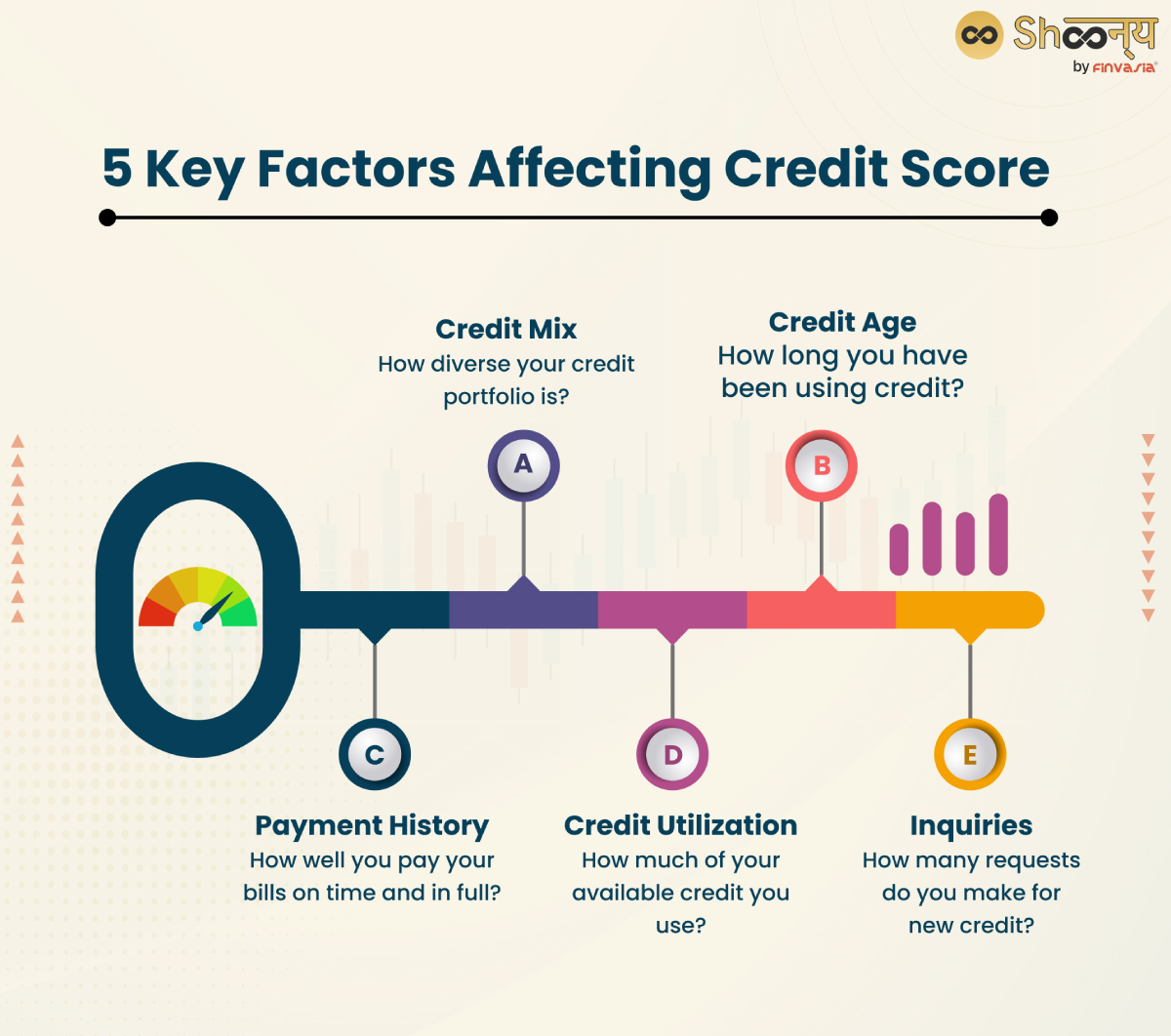Do you know that your credit score affects your financial life? It can influence your chances of getting approved for loans, credit cards, mortgages, and other forms of credit. It can also affect the interest rates and fees you pay. But what all contribute to a good or a bad credit score? What are the factors affecting credit score?
There are many factors that can impact your credit score, some more than others. In this blog, we will explore the five major factors affecting credit score along with factors affecting credit rating of companies in India.
Credit Score and Credit Rating
A credit score is a three-digit number that ranges from 300 to 900. It mirrors your creditworthiness based on your credit history and behaviour.
Credit bureaus like CIBIL, Equifax, Experian, and CRIF High Mark calculate it.
The higher your credit score means better chances of getting approved for credit.
A credit rating is a letter grade or a symbol that represents the credit risk of a borrower, issuer, or instrument. It is given by credit rating agencies, such as CRISIL, ICRA, CARE, and India Ratings.
They base this credit score on their analysis of the borrower’s financial strength, stability, and outlook.
Having a good credit score can open up many possibilities for you.
This includes:
- Getting lower interest rates
- Higher credit limits
- Better loan terms and more financial flexibility
On the other hand, having a poor credit score can limit your options.
This means more time to get approved for credit and costs you more money in the long run.
Why They Matter
- For Companies and Governments
A high credit rating means they can borrow money at lower interest rates, as lenders view them as low-risk. On the other hand, a low credit rating indicates higher risk. Thus, leading to higher borrowing costs or difficulty in obtaining credit.
- For Individuals
A high credit score means you are likely to get loans and credit cards at favourable interest rates and terms. A low score might result in loan applications being rejected or offered at higher interest rates.
What are the factors affecting credit scores, and how can you improve them?
Let us take a look!
5 Factors Affecting Credit Score
There are many factors that can affect your credit score and credit rating, both positively and negatively.

There are many factors that can affect your credit score and credit rating, both positively and negatively.
Some of the most important and common factors affecting credit score are:
Payment History
This is the most influential among all the factors affecting credit score.
It shows your track record of repaying your debts on time and in full. Any late payments, defaults, settlements, or write-offs can severely damage your credit score and credit rating.
They indicate a high credit risk and a low financial discipline.
How can you improve it?
To improve your payment history, you should always pay your bills on time. Avoid missing any payments, and clear any past dues as soon as possible.
Credit Utilization
The utilisation of credit is another key factor affecting credit scores in India.
This is the ratio of your total outstanding credit balances to your total available credit limits. It shows how much of your credit you are using and how much you have left.
It suggests that you are overburdened with debt and may have difficulty managing your finances.
A high credit utilisation ratio is one of the main factors affecting credit score and rating.
How can you improve it?
To improve your credit utilisation, you should keep your credit balances low. You must pay off your debt as soon as possible and avoid maxing out your credit cards.
Credit Mix
This is the diversity of your credit portfolio. This is another key factor affecting credit rating and your credit scores.
It includes the types and number of credit accounts you have, such as credit cards, loans, overdrafts, etc.
A good credit mix can positively affect your credit score and credit rating.
But if you have multiple credits already and are looking for another one.
To improve your credit mix, you should have a healthy combination of secured and unsecured credit.
You must use a mix of short-term and long-term credit.
Credit Age
Another key factor affecting your credit score is the average age of your credit accounts.
It is calculated by dividing the total number of months you have had credit by the number of accounts.
This shows how long you have been using credit and how experienced you are with it.
A longer credit age can positively affect your credit score and credit rating.
It indicates a stable and established credit history and a lower credit risk.
How can you improve this?
To improve your credit age, you should maintain your old credit accounts.
Avoid opening too many new accounts, and keep your credit inquiries to a minimum.
Inquiries
These are the requests made by lenders or other entities to check your credit report or score when you apply for new credit or other services.
There are two types of inquiries: hard and soft.
- Hard inquiries mean when you apply for loans, credit cards, or other forms of credit.
They can temporarily lower your credit score and credit rating.
It happens as multiple queries you are seeking more credit and may have a higher credit risk.
- Soft inquiries form when you check your own credit report or score or when lenders pre-approve you for offers. They do not affect your credit score and credit rating.
How can you avoid this factor affecting your credit score?
You should avoid applying for too many credit products in a short span of time.
Shop around for the best rates within a limited period, and monitor your credit report and score regularly.
These are the five major factors affecting your credit score.
However, for companies receiving credit ratings from agencies, what are the factors affecting credit rating in India?
5 Factors Affecting Credit Rating in India
There are multiple factors affecting credit ratings of companies:
- Company Financials: Companies with strong profits and stable finances receive better credit ratings.
- Industry Risk: If the industry has a lower risk, the company’s credit rating will be higher.
- Management Quality: Companies with effective and experienced management get higher credit ratings.
- Economic Conditions: When the economy is strong, companies generally have better credit ratings.
- Debt Levels: Companies with lower levels of debt receive better credit ratings.
How to Improve Your Credit Score and Credit Rating?
Improving your credit score and credit rating is not a one-time activity. It is a continuous process that requires discipline, patience, and planning.
Here are some best practices to help you boost your credit score and credit rating in India:
• Check your credit report and score regularly:
You should review your credit report and score at least once a year or more frequently if you are planning to apply for new credit or make a major purchase.
You can also track your progress and see how your credit score and credit rating change over time.
• Pay your bills on time and in full:
This is the most effective way to improve your credit score and credit rating. It shows your reliability and responsibility as a borrower.
You should always pay your bills on time and in full and avoid any late payments, defaults, or settlements.
You can use reminders, alerts, or auto-debit facilities to ensure timely payments.
• Keep your credit utilisation low:
This is another key factor that can help you enhance your credit score and credit rating.
It shows your ability to manage your debt and your financial flexibility.
You should keep your credit utilisation ratio less than 30%, and ideally below 10%, of your total available credit limit.
• Maintain a good credit mix:
This factor affecting credit score can help you enhance your credit score and credit rating. It shows your experience and diversity with different types of credit.
You should maintain a good credit mix of secured and unsecured credit, revolving and installment credit, and short-term and long-term credit.
• Limit your credit inquiries:
This is a factor that can protect your credit score and credit rating from unnecessary drops.
You should limit your credit inquiries to only when you need them and avoid applying for too many credit products in a short span of time.
Conclusion
Your credit score and credit rating are two important indicators of your financial health and creditworthiness. To improve them, you need to understand the basis of their calculation and be aware of the factors affecting credit score and credit rating.
By following the best practices of paying your bills on time and in full, keeping your credit utilisation low, maintaining a good credit mix, avoiding too many inquiries, and checking your credit report and score regularly, you can boost your credit score and credit rating in India.
FAQs| Factors Affecting Credit Score and Credit Rating
The five key factors affecting credit score are payment history, credit utilisation, credit age, credit mix, and new credit.
Some of the factors affecting credit rating are financial performance, debt level, cash flow, economic outlook, industry risk, and regulatory environment.
Negative factors that can drop your credit score are late or missed payments, collection accounts, high account balances, high credit utilisation, short credit history, too many accounts with balances, and too many hard inquiries.
Your credit score has a significant impact on your financial life. It affects your ability to get approved for loans, credit cards, mortgages, and other forms of credit. It also influences the interest rates and fees you pay.
______________________________________________________________________________________
Disclaimer: Investments in the securities market are subject to market risks; read all the related documents carefully before investing.

